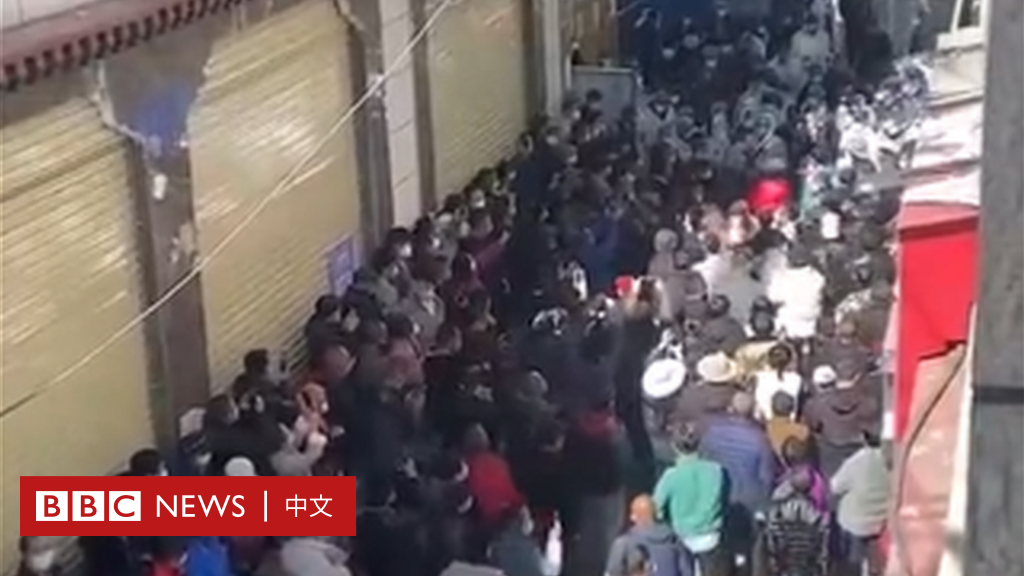image source,Twitter
The video shows people gathering in Lhasa to protest
Video footage has surfaced on social media showing what appears to be a rare mass protest in the Tibetan capital Lhasa against China’s draconian measures to prevent the spread of the novel coronavirus.
Several video clips showed hundreds of people clashing with the police at the site of the demonstration. Most of them are Han workers living in Tibet.
Lhasa has been shut down for nearly three months to fight the latest coronavirus wave.
Tibet is one of the areas with the strictest security in China.
One of the videos showed hundreds of people gathered in the street, with officials stopping them at one end. A loudspeaker is heard calling for calm, while an official says to the crowd: “Everyone understands our job, come back sooner, don’t gather in this place …”
Another video showed dozens of people on the street at night, with the voice of a man commenting on the situation.
In Mandarin, the man said many of the people in the area were migrant workers who had been locked up for too long.
Another video showed people marching through the streets with the caption “We just wanna go home”.
The BBC verified that some of the videos were recently shot in Lhasa. They have since been removed on Chinese social media, but are still circulating on Twitter.
Sources in Tibet told Radio Free Asia (RFA) that protesters threatened to “set fire” if the restrictions were not lifted, although it was not clear what that meant.
Another source said there were fears that the clash between the public and the police could turn violent.
image source,Twitter
A video shows people taking to the streets to leave
A businessman near Jiarong Road in Chengguan district confirmed to the BBC that the protest took place on Wednesday (October 26) afternoon.
Later in the day, officials arrived at the scene to calm the situation, he said. Some were “allowed to go home” the next day, she said.
Another Lhasa resident told the BBC that she did not see the protest because her seat was still blocked, but that she saw many videos circulating in groups of cell phones.
“Everyone is locked in the house every day, everyone’s life is so difficult and they have no income …” said the woman who only revealed her surname, Han, “Now the prices in Lhasa are so high, they are almost like in the first-rate cities, and there is no income. Under the circumstances, the landlord here is still soliciting the payment of the rent … If he does not let him go home, it is all forced, there is there is no way. “
He also said: “When everyone gets together, the meaning is: what to do, how to solve this question, you can let us go …”
Ms. Han said she had been in solitary confinement for nearly 80 days and that people could move around the community for a few hours a day, but they couldn’t go anywhere else.
Regarding the local outbreak, he said: “They (the government) can report as much as they want.”
“The iron door is closed every day on our side now, and the people who say there are Fuyang every day, who knows if they report true or false!”
The BBC has seen many people on the Chinese Douyin platform say they are trapped in Lhasa due to the crown’s new epidemic prevention policy.
“Today is the 77th day of the lockdown in Lhasa … I don’t know how long it will last, I don’t know where my hope is and I don’t know when I will be able to leave … understand the difficulties of migrant workers?” we read in a post. Street.
“Without a penny of income for three months and a lot of expenses, I ask my friends from Lhasa, how long can you last?” we read in another post.
Neither official nor state media commented on the protests, although local officials said Thursday that Lhasa had reported eight new coronavirus cases.
All videos of the incident were blocked on Chinese social media platforms, although Douyin has many people looking for rumors about the protest, such as “what happened in Lhasa tonight”.
Lhasa has been in lockdown since the end of August. Human rights groups say there have been several suicides among Tibetans since the blockade.
China’s zero epidemic prevention policy has reduced the death toll of the new corona epidemic, but has dealt a severe blow to people’s lives and the economy, and public weariness from the blockade and travel restrictions is became more severe.
The protest on Wednesday was described as the largest Lhasa uprising since the riots of 2008.
At least 19 people were killed in that incident and the Chinese Ministry of Security was accused of using beatings and deadly force against the protesters. After the incident, Tibet is no longer open to foreigners and China has also increased its troops in the region by tens of thousands.
Tibet is an autonomous region of China where Beijing claims to have achieved significant development.
But human rights groups say China continues to violate human rights and impose political and religious repression in the region. Beijing denies any violations.


